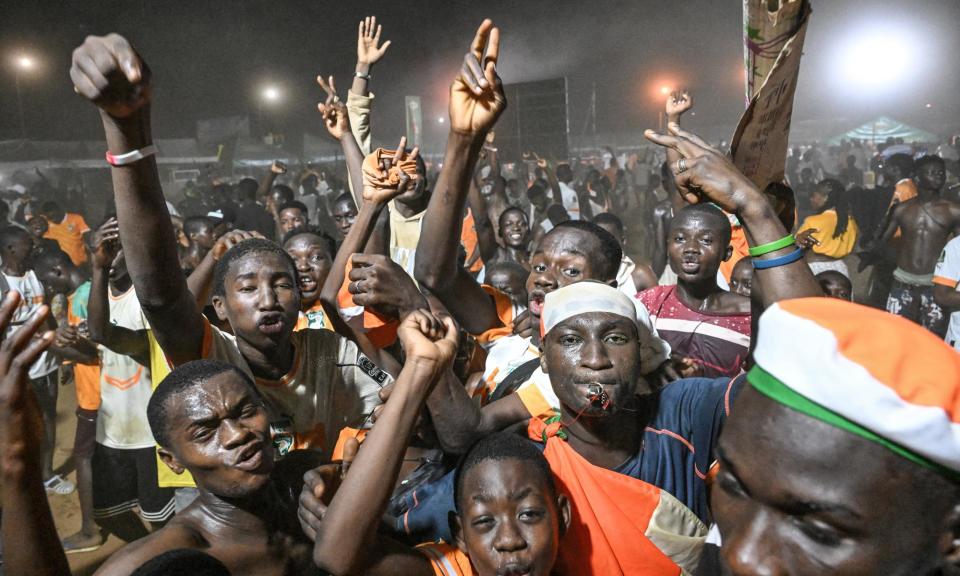Hope and miracles: Afcon’s unlikely semi-finalists carry weight of history

A tournament of extraordinary drama has thrown up two semi-finals that each match one of the continent’s current giants against a team that has distant memories of glory. Neither South Africa nor Democratic Republic of the Congo arrived at the Africa Cup of Nations with especially elevated hopes but on Wednesday they face Nigeria and the hosts Ivory Coast respectively for a place in the final.
Ivory Coast, whose golden generation spent so long narrowly missing out on the trophy, are, like their opponents, looking to win the tournament for the third time. The difference is that it is 50 years since DRC last triumphed. They were one of the early powers of African football, winning the tournament in 1968 and then again, as Zaire, in 1974, the year in which they became the first sub-Saharan African side to play at the World Cup.
Related: She shoots … but can Gambia’s trailblazing female photographer score a place at the World Cup?
That story, thanks to Mwepu Ilunga charging from the wall to belt away a free-kick, is all too well-known and, even if it is now fairly widely recognised that he was trying to waste time to stave off the sort of heavy defeat that might have brought recriminations from the Mobutu government, the sense of farce tends to overshadow just how good Congolese football was at the time. TP Englebert (now TP Mazembe) appeared in four successive African Champions League finals between 1967 and 1970, enjoying a ferocious rivalry with the Ghanaian club Asante Kotoko. AS Vita of Kinshasa also lost to Kotoko in the final in 1973.
DRC has the 16th-highest population in the world. Given that, and such a proud history, three semi-final appearances in the past 50 years is thin gruel. Mobutu and his recognition of the value of sport, which led most famously to the Rumble in the Jungle in 1974, proved first a stimulus and then a toxin. It never sat easily with the regime that Englebert were based in Lubumbashi, the heartlands of support of Patrice Lumumba, the first post-independence president, who was murdered by Mobutu as he seized power in 1961. The divide between players from Lubumbashi and Kinshasa was a major problem at the 74 World Cup.
The conflicts that have followed Mobutu have ravaged not only DRC, now desperately reliant on Chinese investment and ranked 186th out of 189 by the International Monetary Fund (IMF) for GDP per capita, but also its football, with clubs now commonly owned by political and military figures. Although the UN peacekeeping mission is withdrawing, fighting has recently intensified between government troops and the M23 rebels in the east of the country, while attacks by Islamist groups on civilian targets go on.
In such circumstances, football takes on a curious role, simultaneously entirely trivial but also a vital symbol of life going on, of possibility and of engagement with the wider world. “We know the importance of the game for us and for the country,” the DRC head coach, Sébastien Desabre, said. “We have to make sure those who are suffering in the country are proud of us. We have a responsibility to provide joy and hope.”
There is an odd sense that Ivory Coast don’t feel much responsibility at all, despite the more than $1bn expenditure on the tournament, as though the thought of elimination was processed after their defeat by Equatorial Guinea. Having then snuck through as a best third-place side, they have needed late equalisers and winners to drag them past Senegal and Mali. “These provide us with more mental strength,” said the head coach, Emerse Faé, who took over after the group phase. “If you do not have that mindset, you cannot achieve those miracles.”
The other semi-final pits the two best defences in the tournament against each other. Both South Africa and Nigeria have kept four clean sheets in a row. South Africa’s glorious past is more recent than DRC’s, having won on home soil in 1996 and followed that with defeat in the final and then in the semi-final in the following two tournaments. With a strong domestic league there was an assumption they would at least be regular challengers but this is their first semi-final since.
The likelihood is that eight of their starting XI will come from a Mamelodi Sundowns side that has won the last six league titles. That may provide cohesion in the short term, but the domination of the team owned by the president of the Confederation of African Football (CAF), Patrice Motsepe, isn’t necessarily a sign of long-term health.
Nigeria are seeking a fourth title that would put them level with Ghana as the third-most successful side in African history, but no side has lost more than their seven semi-finals. And they may to face this one without Victor Osimhen, who didn’t fly to Bouaké with the rest of the squad on Monday because of “abdominal discomfort”.
Recent form and status says it should be an Ivory Coast versus Nigeria final, but very little that should have been has been in this most unpredictable of tournaments.

 Yahoo Sport
Yahoo Sport 





































